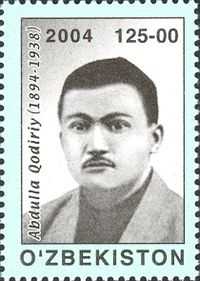Abdulla Qodiriy
| Abdulla Qodiriy | |
|---|---|
|
An Uzbek stamp made in honor of Abdulla Qodiriy | |
| Born |
April 10, 1894 Tashkent Russian Turkestan |
| Died |
October 4, 1938 (aged 44) Tashkent Uzbek Soviet Socialist Republic |
| Occupation | Playwright, poet, writer, and literary translator |
| Notable awards |
|
Abdulla Qodiriy (sometimes spelled Abdullah Qadiri in English) (Uzbek: Abdulla Qodiriy, Абдулла Қодирий; Russian: Абдулла́ Кадыри́) (April 10, 1894 – October 4, 1938) was an Uzbek and Soviet playwright, poet, writer, and literary translator. Qodiriy was one of the most influential Uzbek writers of the 20th century.[1][2] He introduced realism into Uzbek literature through his historical novels and influenced many other Central Asian novelists,[3] including the Kazakh writer Mukhtar Auezov.[4]
Qodiriy wrote under various pen names, the most renowned being Julqunboy. His early works were influenced by the Jadid movement. Qodiriy was executed during the Great Purge under the leadership of Joseph Stalin.[4]
Life
Abdulla Qodiriy was born on April 10, 1894, in Tashkent, then Russian Turkestan. His father, Qodirbobo, was 74 years old when Qodiriy was born. Qodiriy did a variety of menial jobs before a merchant hired him as a book copier. He became interested in writing in the middle of the 1910s.
Qodiriy was briefly arrested in 1926 for his article "Yigʻindi gaplar" ("A Collection of Rumors") that was published in Mushtum. He was arrested again on December 31, 1937, as "enemy of the people". He was executed on October 4, 1938, in Tashkent.
Work
Qodiriy's most famous works are the historical novels Oʻtgan kunlar (Days Gone By) (1922) and Mehrobdan chayon (Scorpion in the Pulpit) (1929).[1] Oʻtgan kunlar is the first full-length novel by an Uzbek author.[2] Qodiriy's stories Kalvak Mahzumning xotira daftaridan (From Mahzum the Simpleton’s Diary) and Toshpoʻlat tajang nima deydir? (What Does Irritated Toshpoʻlat Say?) are considered to be one of the best satirical stories in Uzbek.[3]
Qodiriy also wrote many plays and numerous newspaper articles. He was fluent in Arabic, Persian, and Russian. Qodiriy translated into the Uzbek language the works of many famous Russian writers such as Nikolai Gogol and Anton Chekhov. In particular, he translated Gogol's Marriage (1842) into Uzbek.
References
- ↑ 1.0 1.1 Fierman, William (2009). "Uzbekistan". Microsoft Student. Redmond, WA: Microsoft Corporation.
- ↑ 2.0 2.1 Mirvaliyev, Sobir. "Abdulla Qodiriy". Ziyouz (in Uzbek). Retrieved April 8, 2012.
- ↑ 3.0 3.1 "Qodiriy, Abdulla". Ensiklopedik lugʻat (in Uzbek) 2. Toshkent: Oʻzbek sovet ensiklopediyasi. 1990. p. 490. 5-89890-018-7.
- ↑ 4.0 4.1 "Uzbek Literature". Encyclopædia Britannica. Retrieved April 8, 2012.
